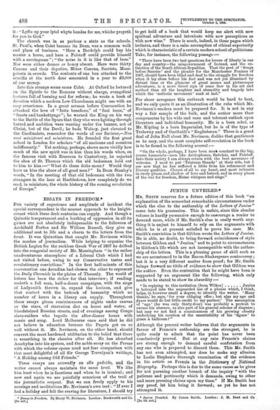ESSAYS IN FREEDOM.*
FOR variety of experience and amplitude of incident the special correspondent is the nearest approach to the knight- errant which these drab centuries can supply. And though a Quixotic temperament and a loathing of oppression in all its guises are not absolutely indispensable to the followers of Archibald Forbes and Sir William Russell, they give an additional zest to life and a charm to the letters from the front. It was Quixotism that caught Mr. Nevins= within the meshes of journalism. While helping to organise the British Legion for the reckless Greek War of 1897 he drifted into the congenial society of Mr. Massingham "in the rather unadventurous atmosphere of a Liberal Club which I had not visited before, owing to my Conservative tastes and revolutionary convictions." In the first half-minute of this conversation one .Arcadian had chosen the other to represent the Daily Chronicle in the plains of Thessaly. The world of letters has been the richer for that interview; if reading maketh a full man, half-a-dozen campaigns, with the siege of Ladysmith thrown in, expand the horizon, and give that contact with the bedrock of humanity which no number of hours in a library can supply. Throughout these essays gleam reminiscences of nights under canvas or the stars, of starvation diet on horse and water, of bloodstained Russian streets, and of evenings among Congo slave-raiders who beguile the after-dinner hours with music and song. Lord Melbourne once said that he did not believe in education because the Pagets got on so well without it. Mr. IN evinson, on the other hand, should convert the most hardened utilitarian to the belief that there is something in the classics after all. He has absorbed Aeschylus into his system, and the noble essay on the Persae with which the volume opens need not fear comparison with that most delightful of all Sir George Trevelyan's writings, "A Holiday among Old Friends."
These essays are avowedly an olla podrida, and the writer cannot always maintain the same level. We like him least when he is facetious and when he is ironical ; and now and again we are painfully conscious of the trail of the journalistic serpent. But we can freely apply to his musings and meditations Mr. Nevinson's own test: "If ever I had a holiday and felt the craving for literature, I should try • Nemo in Freedom. By Henry W. Nevinson. London: Duckworth and Co. Oa. net.]
to get hold of a book that would keep me alert with new spiritual adventure and intoxicate with new perceptions as with new wine." There is much, indeed, in these pages which irritates, and there is a calm assumption of ethical superiority which is characteristic of a certain modern school of politicians. Take, for instance, the following passage :—
"There have been two test questions for lovers of liberty in our day and country—the misgovernment of Ireland, and the ex- tinction of the South African Republics. That the poet of Songs before Sunrise' and the pleader for the Manchester Fenians of 1867, should have been blind and deaf to -the struggle for freedom when it lay close before his feet and was not yet illumined by distant time or the glamour of great names and picturesque adventures, is a more direct sign of some flaw in his art and method than all the laughter and absurdity and tragedy into which the testhetic movement' sank at last."
For sheer arrogance this outbreak would be hard to beat, and we only quote it as an illustration of the rubs which Mr. Nevinson's readers must be prepared for. It is not in any way a fair sample of the bulk, and the author more than compensates by his wide and sane and tolerant outlook upon literature and individual humanity. He is a born rebel, as Mr. Kipling is a born Imperialist, but he is of the type of Trelawny and of Garibaldi's "Englishman." There is a great deal of John Bull about Mr. Nevinson, dislike that gentleman as he may, and the most complete self-revelation in the book
is to be found in the following avowal :—
" On the whole, perhaps, I have been mosb constant to the big, coarse humorists—men like Aristophanes, Rabelais, and Falstaff. Into their society I can always return with the best assurance of welcome. I used to put Tristram Shandy' at their side, but I see now that he has suffered a little from his refinement and literary qualities. Closest of all to my heart, and most intimate in every gleam and shadow of love and hatred, and in every phase of the wax for freedom, Heine whispers and sings."


























































 Previous page
Previous page